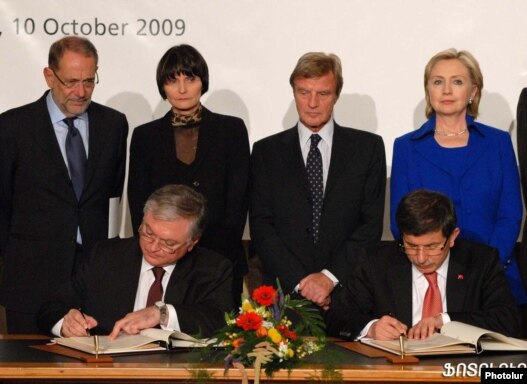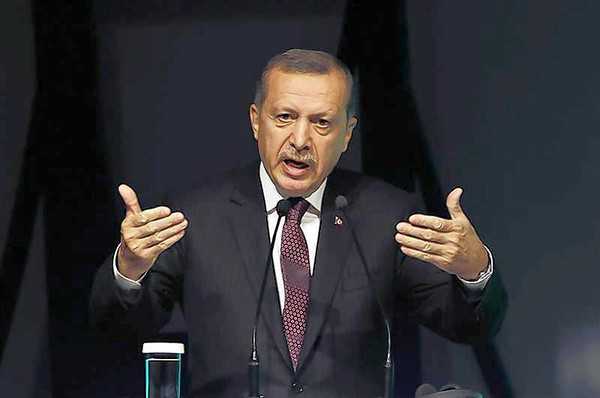Transmission
 U.S. officials, including Secretary of State Hillary Clinton (standing, right), have put pressure on Turkey and Armenia to ratify the agreement signed by Foreign Ministers Eduard Nalbandian and Ahmet Davutoglu in Zurich last year.
U.S. officials, including Secretary of State Hillary Clinton (standing, right), have put pressure on Turkey and Armenia to ratify the agreement signed by Foreign Ministers Eduard Nalbandian and Ahmet Davutoglu in Zurich last year.
In 2007 when the House committee approved a resolution asking the U.S. president to recognize the Armenian killings as genocide, critics argued forcefully that the passage of such measure could put the U.S. troops in Iraq in harm’s way and damage already deteriorating relations between Ankara and Washington.
Almost every member of the Bush administration, including former Secretary of State Condoleezza Rice and Secretary of Defense Robert Gates, issued statements with stern warning of the dire consequences passage of the resolution would have for U.S. interests in Iraq and elsewhere in the wider Middle East.
The pressure from the Bush administration worked; though the committee passed the resolution, it was never sent to the full House of Representatives for a final vote.
Yesterday’s vote was different. The pressure from the White House was not so visible and there were no public attempts to prevent the vote. The statements coming from the White House and the State Department repeated the same line, that Turkey and Armenia should move forward in implementing the protocols to normalize relations.
The Obama administration also refrained from taking sides publicly on the issue. Secretary of State Hillary Clinton, for one, had a chance to appeal to committee members not to consider the Armenian resolution when she was testifying before the House panel in late February.
It became known just hours before the vote on March 4 that Clinton had spoken with committee Chairman Howard Berman expressing concern that further congressional action could jeopardize the fragile process of rapprochement between Yerevan and Ankara.
Turkey’s reaction to the vote has been furious. Turkey accused the Obama administration of not doing enough to stop the vote in the House committee, and has recalled its ambassador in Washington for consultations. The Turkish foreign minister, Ahmet Davutoglu, said today the Obama administration had not sufficiently put its weight behind efforts to block the vote.
Why were Obama administration officials reluctant to put strong pressure on Chairman Berman or on other fellow Democrats in the House committee, where they have a majority?
One reason could be the level of U.S. frustration with Turkey’s leaders. The patience with Ankara’s handling of the Armenian-Turkish issue may be running out. The administration was hoping that the protocols wouldn’t be held hostage by domestic politics in Turkey and be delayed in the long process of parliamentary politicking.
President Barack Obama and Clinton have told Turkish leaders many times that they should not tie the ratification of the protocols to the resolution of other difficult issues, such as the Nagorno-Karabakh conflict. Just a day before the committee vote, Obama urged his Turkish counterpart Abdullah Gul to speed up ratification.
Now that the House panel has passed the resolution, which could go to the full House for a vote at any time, the White House may now have a tool to break Ankara’s unwillingness to move forward and normalize its relations with neighboring Armenia. The Obama administration can now say, “Ratify the protocols or the genocide resolution will go to the full House for a vote.”
There is, however, another trend that is unlikely to be reversed. It’s becoming increasingly difficult for a U.S. presidential candidate, including Obama, to promise Armenian-Americans to recognize their century-old tragedy as genocide, and then break that promise once elected president. How many times can Obama skip the word “genocide” in his annual proclamation on the mass killings of Armenians in the Ottoman Empire? He already did last year. What will happen this year?
— Harry Tamrazian
—————————————————comments —————————————–
This resolution does not prove anything from historical point of view, and yet it doesn’t provide any help to the region. I am very disappointed of wasted time and energy of House members because of the persistent appearance of this resolution.
Turkey-USA relations and American interests in Iraq and Afghanistan may be negatively impacted.
The House Foreign Affairs Committee voted for an incredibly dishonest and racist resolution which seems to be penned by the Armenian lobby but known to be rammed through the political process via irresponsible politicians whose survival depend on the Armenian support. Chairman Berman seemed determined to pass the resolution as he extended voting time stretching the rules and even strong armed wandering members to come in and vote. As soon as the Yes votes surpassed the No votes by one, Berman called the passage and ended the voting.
Always the strongest lobby in Washington DC, the administration, was conspicuously absent this year in opposing the ill-informed, ill-advised, and non-binding resolution. Obama administration, unlike his predecessors Bush and Clinton, did not act until the very end. It was too little to late when Hillary Clinton finally made that call to Berman urging defeat of the resolution—perhaps afterthought triggered by Turkish President Gul’s phone call to Obama yesterday. Also absent in opposing the racist and dishonest resolution was the Jewish lobby, arguably as a result of Erdogan’s strongly worded criticism of Israeli policies in Lebanon and Gaza.
Given the nonappearance of the above major players this year in the opposing side, it was expected that the deceptive and fraudulent resolution would easily clear the HFA. The race, however, was surprisingly close. So close, in fact, that Berman pulled all his dirty tricks out of the bag to extend the voting time to strong arm a few wandering members of HFAC for a last second victory by only one vote. After seeing that dirty politicking, one is reminded why politicians score at the bottom of public confidence and trust scales.
The establishment of commission to study the allegations of genocide is not really a compromise of the Armenian Republic. As such, Armenian state is unable to control or drive the “genocide recognition” campaign worldwide, hence its agreement to establish a commission means not much in practical terms vis-a-vis practical benefits such as the border opening.
As far as refugee details, as a consequence of Nagorno-Karabakh conflict started by Armenia, there were 300,000 Armenians displaced from non-occupied parts of Azerbaijan and 250,000 Azeris displaced from Armenia + close to 1 million from occupied Azerbaijani territories. And again, there is no need for exaggerations, just straight facts: 26 Armenians and 6 Azeris were killed in 1988 Sumgait riots, while the events were investigated a by Soviet court. Those guilty of organizing Sumgait riots were brought to justice and punished: Azeri organizers were sentenced to death, while Armenian organizers received up to 15 years (!). This was justice served and Azerbaijani side at least has courage to admit facts.
Now, 613 Azeri civilians, including 106 women and 83 children, were massacred in cold blood with mutilations, during 1992 Khojaly massacre . Where is the court? Where is investigation? Why Armenian side attempts to deny this crime, while there are references from Monte Melkonian and Serge Sargsyan to Armenian side committing this crime? How moral does such denial make Armenian demands to recognize 100 year historical events as a “genocide”?
We need to put politics aside. We think that if we admit what we did that the world and especially Europe will figure out that we’re really not European and just a bunch of barbarians. But as a Turk who grew up in Europe, trust me, they already think of us as “bloody Turks.” There is one thing to use our political, economical or military strength to force others to pay lip service to us then there’s genuine respect. I don’t expect anything to happen with this resolution…but the truth is all those US Congressmen, Sec. Hillary Clinton, Vice President Joe Bidon, and President Barack Obama that are against the resolution believe that we committed Genocide. Our government is just scaring them into hushing it up.
As an earlier commentator noted Germany not only admitted to the Jewish Genocide but paid reparations and are the most respected nation in Europe. We have to grow up. They don’t want us in Europe not because we’re Muslim but because they don’t believe we’re mature enough as a nation. There’s one thing to do business with a “bloody Turk” but it’s another thing to live with them.
What makes me upset – is RFE becoming a mouthpiece for Armenian propaganda. Shame for the organization claiming to be professional and balanced.
The Turkish-Armenian rapprochement (and border opening, which is the primary objective from Armenian point of view) is impossible without resolution of Nagorno-Karabakh conflict and withdrawal of Armenian forces from occupied territories. The rapprochement is also impossible by intimidation or blackmailing of Turkey using such non-constructive techniques as legislating one side of the controversial historical debate.
US Congress and those who endorse this resolution from American side actually bring the worst damage to America itself. Rewarding Armenia endlessly at the cost of challenging the dignity of allied Turkish nation and extending the misery of 1 million Azeri refugees does not resolve anything but only creates a negative and biased perception of America. The U.S. policymakers made any solution as well as their own foreign policy a hostage to a limited group of radicals pursuing irredentism as their ideology. Is the U.S. objective to please these radicals in their dream of establishing greater Armenia over parts of Turkey and Azerbaijan, which is why these conflicts exist in first place? This would be similar to fighting Taliban or Al Qaeda by endorsing violent fundamentalism as a human right.
Finally, when Turks and Azeris insist on resolving Karabakh conflict in parallel, their objective is achieving peace in the region. That is the ultimate objective of any rapprochement or conflict resolution. Why Armenia and some pro-Armenian U.S. lawmakers are trying to separate these two processes which have the same objectives will never be understood.






